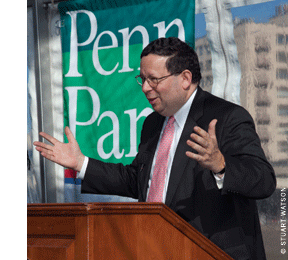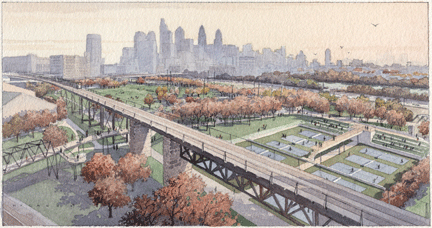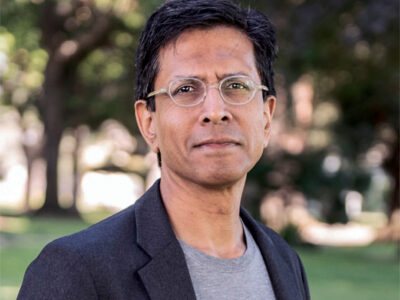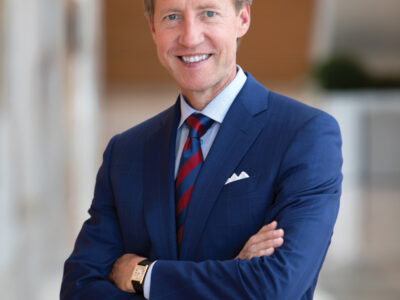Homecoming Features Arts & Culture, a Football Win, Penn Park Groundbreaking— and a New Trustee Chair

Call it a win-win all around for balancing innovation and continuity.
This year’s Homecoming broke with tradition, as a varied slate of arts and culture offerings shared center stage with longtime headliner football. Another departure from recent history came in the form of a new chair of Penn’s trustees, David L. Cohen L’81, who took the reins as the University’s top volunteer midway through the weekend. Cohen is the first resident Philadelphian to serve as chair in a good while, and while he is a Penn alumnus, his degree is from the Law School rather than an undergraduate program.
Yet though he may not conform exactly to the “standard model” of trustee chair, Cohen is far from an unknown quantity, either in the city or among Penn’s volunteers. Chief of staff to Ed Rendell C’65 Hon’00 during his two terms as mayor of Philadelphia in the 1990s, Cohen is currently executive vice president of Comcast Corporation. An indefatigable civic leader, he was recently ranked No. 1 in Philadelphia magazine’s “Power Fifty”—ahead of both (now Pennsylvania Governor) Rendell and City Hall’s current occupant, Michael Nutter W’79. At Penn, Cohen has served as a University trustee since 2001, and since 2002 has been the chair of Penn Medicine, the entity created that year to oversee the School of Medicine and the Health System after several years of multi-million dollar losses.
Oh, and they also still played a football game at Homecoming—a rousing 42-7 victory over Princeton that was an essential step along the road to the Quakers winning their first Ivy title since 2003.
“Having your first weekend as chair on Homecoming is great,” says Cohen, adding that it was appropriate that his first official appearance in his new role was to speak at the Penn Alumni board meeting on Saturday morning, since alumni “are obviously the most important element, the foundation of Penn.” The University’s momentum and success in recent decades “is very much tied to increasing alumni engagement, and [alumni] are certainly one of the primary audiences I plan on spending a lot of time with,” he says.
Cohen was still a chair-in-waiting at the trustees stated meeting on Friday, November 6, which was presided over by departing chair James S. Riepe W’65 WG’67. The night before featured a tribute dinner honoring his decade of service, which began in 1999. The accolades spilled over into Friday’s meeting, despite his best efforts to quell them, climaxed by a “resolution of appreciation” read in tandem by vice chairs George A. Weiss W’65 (who also heads Penn’s ongoing $3.5 billion Making History campaign) and William L. Mack W’61.
“Today we know that when Jim became chair of the trustees in 1999, he was absolutely the right person in the right position at the right time,” it stated in part. “During the last five years of the transformative Rodin years and the first five years of the history-making Gutmann administration, he played a crucial role in making Penn the thriving, diverse, highly rated university of choice it is today.”
Citing Riepe’s influence in putting the then-overextended and money-losing Health System “on sound financial footing” and in guiding the creation of “prudent fiscal and operational policies” for the University as a whole, the resolution noted that “his commitment, financial expertise, and ability to identify other volunteer leaders accounts for much of Penn’s current strength.” It added that Riepe also took on two challenges “many chairs never embrace—starting a campaign and selecting a president.”
Cohen echoes the praise. “Jim Riepe really set the platinum standard for being chairman of the University trustees,” he says. And the former chair won’t get much of a rest from his labors, either, since it was also announced at the meeting that Riepe would assume Cohen’s old job as chair of Penn Medicine. Cohen calls that “symptomatic of Jim’s incredible loyalty and his desire to continue to serve Penn,” not to mention “incredibly fortunate for the University and Penn Medicine.”
Both men spoke at the official groundbreaking for Penn Park, which will create 24 acres of playing fields and green space along the Schuylkill River. Scheduled for completion in 2011, the $46 million project is a key component of the University’s master plan, Penn Connects.
“This has been a long time coming,” Riepe said, noting that the idea of Penn purchasing the land from the U.S. Postal Service, which had used the site mostly for vehicle parking and fueling, was first broached as far back as the 1980s. He praised the “unflagging efforts” of all those who helped move the project forward “throughout the decades” at Penn, in the city, and at the federal level.
“It’s a win for Penn and it surely is a win for the city of Philadelphia as well,” he said.
In his remarks, Cohen recalled a meeting in the early 1990s at City Hall soon after Rendell’s mayoral inauguration, at which former Penn President Sheldon Hackney Hon’93 and emeritus trustee Myles Tannenbaum W’52 L’57 pitched a similar general concept, laying out the importance for the University—and the city—of Penn being able to expand its campus eastward. Though hardly as good as the current plan, “it was an incredibly compelling vision at the time, and I can’t tell you how exciting it is for me to be here today to see this reality,” he said.
As thrilling as the project’s start is, “it’s going to be even better two years from now at the ribbon-cutting, when it’s all green and filled in and we have created something unique in American cities,” he said.


Cohen first became broadly known after the publication of A Prayer for the City, Buzz Bissinger C’76’s highly praised book about Philadelphia during the first mayoral administration of Ed Rendell. The Odd Couple relationship of the two men was at the center of the book (Bissinger’s first chapter is titled “Ego and Id”), and it cemented Cohen’s reputation for meticulous brilliance and an insatiable capacity for work. (Rendell, Cohen, and Bissinger posed on a City Hall stairway for the cover of the Gazette’s February 1998 issue, which included an excerpt from the book.)
Long associated with the law firm Ballard Spahr, Cohen returned there after Rendell left office in 1997, serving as chairman until 2002, when he joined Comcast Corporation, the cable giant founded by Ralph Roberts W’41 Hon’05 and currently headed by Brian Roberts W’81. His list of volunteer affiliations is—really—too long to mention, but includes the Greater Philadelphia Chamber of Commerce, CEO Council for Growth, City Year, the National Urban League, National Council of La Raza, and the Jewish Federation of Greater Philadelphia, among others.
Cohen may be the city’s biggest mover and shaker in Philadelphia magazine’s estimation, but he’s quick to note that, as chair of the trustees, his job is not to make policy but to provide the volunteer leadership to support the president, senior administrators, deans, and faculty “in making Penn the premier higher-education institution in America.”
The main advantage of being a local, he says, is first of all that it’s easier to get to campus than from, say, New York or Baltimore. But forging connections locally as well as globally is an essential component of President Gutmann’s Penn Compact, he points out. “I think one of the most important connections that Penn has—one of our competitive advantages, one of the things that really can help to speed the momentum [developed] over the past decade—is our connection to Philadelphia, and obviously that’s a passion of mine,” he says, characterizing his devotion to the city as “almost equal” to that for Penn. “I think that having a chair of the trustees as the president’s partner, who feels equally strongly about building connections between the University and the City of Philadelphia, has to be an advantage.”
The period since Cohen’s selection as chair was announced back in December 2008 has been a challenging one for the economy and for higher education in particular, and Cohen praises President Gutmann’s administration for its response to the financial meltdown. “They understood the risks of what lay ahead of us, and I think very aggressively developed an appropriate contingency plan,” he says.
While Penn has had to make some difficult decisions to control expenses, “when you look at our peer institutions I think we were among the earliest to act, were among the most decisive to act, and as a result of that the steps that we’ve had to take are less severe than the steps that have had to be taken by virtually all of the rest of our peers.”
He believes that Penn is well positioned to operate in the current environment, with its history of fiscal prudence and focus on making the most of its (comparatively) limited resources. “We’ve had to think smarter, think leaner,” he says. “I think the past 12 to 18 months have been reinforcing [those practices] and I’m sure we’ll continue to see that moving forward.”
As a Law School graduate—his undergrad degree is from Swarthmore—Cohen’s campus experience was different from that of the average Penn undergraduate, but he says that won’t affect his priorities. There’s a powerful consensus among the trustees that undergraduate education is the backbone of the institution, he says, so there’s no danger it will be neglected, regardless of who the chair is.
“Certainly the more standard model during the time I’ve been engaged with Penn is for the chair of the trustees to be a Penn undergrad and to not be from Philadelphia, so we’re breaking the mold in a couple of ways,” Cohen says. “Most of what I bring to the table [as a volunteer] is my judgment that was developed post my attendance at Penn. What my attendance at Penn brings to me is my passion for the University, my commitment to the University, and my loyalty to the University. I don’t think it makes much of a difference on those dimensions whether you were an undergrad or a graduate of one of the graduate or professional schools.”
Cohen says he has used the “nice, yearlong transition period” since his selection was announced to meet with as many trustees, deans, senior administrators, and others to “get to know them a little bit more on a personal level and understand their priorities and desires. I have been incredibly happy and pleased with that transition process.”
He adds that, because of the strides Penn has made over the past 15 years, he has the “luxury as chair to have a relatively simple agenda”: to build on that momentum by helping President Gutmann “complete the work on all three elements of her Penn Compact” and to be a “good partner to George Weiss and the campaign leadership and the president in successfully completing the Making History campaign
“I get to come in as a leader in an institution where, not only is nothing broken, but everything is functioning at an extremely high level,” he says.
—J.P.




